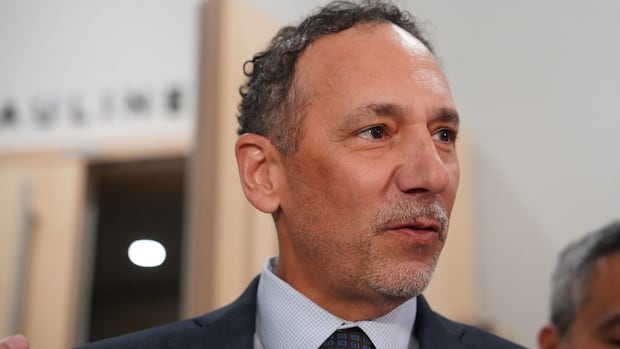The federations representing Quebec’s medical specialists and family doctors say they will take the government to court to challenge Premier François Legault’s bill, tabled this morning, that changes doctors’ remuneration and seeks to end their pressure tactics. The president of the Fédération des médecins spécialistes du Québec (FMSQ), Dr. Vincent Oliva, says it has already begun the legal process. “It’s clear that there are legal elements in this that are absolutely ridiculous and questionable,” he said Friday afternoon.A few hours later, the Fédération des médecins omnipracticiens du Québec (FMOQ) announced it was following suit.Bill 2, titled an Act mainly to establish collective responsibility with respect to improvement of access to medical services and to ensure continuity of provision of those services, follows the broad lines of what was laid out in Bill 106, which was tabled in May, including linking physicians’ pay to performance indicators to get them to take on heavier patient loads. The special law comes after the province tabled its fourth offer amid stalled negotiations and pressure tactics by doctors and medical specialists, who have been without a contract since 2023.”[Health Minister Christian Dubé] lured us to the negotiation table four times while he was working on a bill that he planned to adopt all along,” said Oliva. “That’s more than bad faith, it’s lying.”Speaking with reporters on Friday afternoon, Dubé defended the special legislation, saying the government had no choice but to ”draw a line” to make sure Quebecers receive care.”I know these are big changes for the doctors,” Dubé said, while describing the current health-care system as ”pay-and-pray.””We can no longer do that with the money that we’ve put into health care.” Christian Dubé spoke with reporters on Friday and defended the special legislation, saying the government had to ”draw a line” and make sure Quebecers are being cared for. (Sylvain Roy Roussel/CBC)CAQ says bill is for the patients, doctors dispute that With 1.5 million Quebecers without a family doctor, including 200,000 patients who are vulnerable, access to health-care services is a top priority, says the Coalition Avenir Québec (CAQ) government. Under the proposed legislation, every admissible Quebecer will have to be assigned to a family medicine group or the equivalent.Technically, 15 per cent of doctors’ annual salaries will be linked to performance indicators, with a collective monetary supplement paid to family doctors and specialists if they reach certain goals aimed at improving access to medical services or ensuring the quality of the services. The bill also includes a provision to end pressure tactics by physicians and the groups that represent them, with significant penalties for those who take part in “concerted actions” such as refraining from training future doctors. Oliva says he doesn’t encourage doctors to disobey the bill in that aspect. Speaking Friday afternoon, he called the CAQ’s move “authoritarian,” criticizing Dubé.”He unilaterally imposes targets on doctors that he decides himself without providing tools. He unilaterally renews our framework agreement until 2028, he flouts our right to negotiation,” he said. Speaking out of Quebec City Friday morning, the president of the FMOQ, Dr. Marc-André Amyot, said the premier is disconnected from reality on the ground.“[The] bill will have devastating effects on the accessibility of services for the population, demotivating effects for doctors,” he said. “There is a shortage of 2,000 family doctors in Quebec and we are far from improving this shortage with a bill like this.”Dr. Marc-André Amyot is the president of the Fédération des médecins omnipraticiens (FMOQ) representing family doctors in Quebec. (Salah Tebessi/Radio-Canada)He said he expects a progressive exodus of doctors from the province and early retirement announcements given that 22 per cent of Quebec’s doctors are over the age of 60.Amyot says the FMOQ is not against the goals laid out in the bill – of creating 16.5 million appointment slots per year or ensuring that 98 per cent of surgeries are performed within one year of the surgical request, among others – but tying those goals to doctors’ remuneration is a mistake, he says. “If I don’t have control – I don’t have the resources to carry out these appointments. Twenty-five per cent of the resources that were to be provided contractually to family medicine groups (FMG) aren’t being provided,” he said.Amyot says arbitration is still possible if Legault were to take a step back and request it, saying that patients are the “losers in this situation.”WATCH | Legault attempting to force doctors to fall in line:Quebec doctors to challenge ‘Soviet prison’ bill forcing pay changes, fines if they try to leaveQuebec has tabled a special law to end doctors’ pressure tactics over proposed changes to how they are paid and enact those changes. Bill 2 also goes much further than the health minister’s previous legislation, with the Legault government attempting to force doctors to fall in line. ‘Fast-food medicine’ The province’s public health insurance board, the Régie de l’assurance maladie du Québec (RAMQ), will be tasked with putting in place a mechanism to ensure all eligible patients are affiliated with a health facility or family doctor.The RAMQ will also be responsible for determining a person’s vulnerability level, with priority given to patients with more serious health problems.In the new remuneration model, the doctors will receive a fixed amount based on the number and complexity of patients treated. That amount could range from $2.29 for a healthy patient to $41.19 for a very sick patient.They will also receive an hourly rate paid for working hours, including administrative tasks and there will be an amount paid for certain “acts” or specific services, which includes consultations. Penalties would also be imposed on doctors who leave Quebec’s public network to practise outside the province. These include fines and loss of years of practice for those who subsequently wish to re-enter the Quebec public network. For Dr. Benoît Heppell, Legault’s bill means his clinic out of Sherbrooke, Que., will have to take in 6,000 new patients and create 12,000 new appointment slots per year, he says. He’s contemplating leaving his teaching job at the University of Sherbrooke’s Faculty of Medicine to better handle the additional workload.The new remuneration system, he says, will result in a trade-off between quality of service and quantity, leading to what he and the FMOQ call “fast-food medicine.” “The quality will decrease and the health-care provider will lose their motivation. They will take this job like a job — my personal investment maybe will be less than before.”WATCH | Where Legault stands and how doctors are reacting:Quebec ‘won’t give in’ to doctors as premier threatens bill to end conflict over their payFrançois Legault’s government is planning to table a special legislation Friday at the National Assembly to stop doctors’ pressure tactics and move forward with changes to the way they’re compensated. In a video, Legault said he’s not doing this against doctors but for Quebecers. Heat from the oppositionLegault’s plan to force through a special law has also been criticized by opposition parties.Québec Solidaire health critic Vincent Marissal said the government’s special law amounts to invoking closure — a parliamentary procedure that limits the time devoted to debating a motion or bill and thereby fast-tracks its adoption.”The opposition is being gagged,” he said, ahead of Friday’s special session. “I am being deprived of my voice in my regular parliamentary work.”On Thursday, Marissal said the move would “further poison our already rotten relationships with doctors,” while not providing any benefits to patients. Quebec Solidaire’s co-spokesperson Ruba Ghazal went further, accusing Legault of drifting toward authoritarianism after invoking closure eight times in seven years. “What he’s doing isn’t finding solutions for our ailing health system, what he’s doing is exploiting it,” she said. “He exploits elected officials, he exploits doctors, he exploits patients, he exploits the National Assembly and then our democracy.”Quebec Liberal Leader Pablo Rodriguez, meanwhile, reiterated a previous message, saying “the only good agreements are those that are negotiated and signed at the table,” but that once again, the government had chosen confrontation.
Wednesday, 4 Feb 2026
Canada – The Illusion
Search
Have an existing account?
Sign In
© 2022 Foxiz News Network. Ruby Design Company. All Rights Reserved.
You May also Like
- More News:
- history
- Standing Bear Network
- John Gonzalez
- ᐊᔭᐦᑊ ayahp — It happened
- Creation
- Beneath the Water
- Olympic gold medal
- Jim Thorpe
- type O blood
- the bringer of life
- Raven
- Wás’agi
- NoiseCat
- 'Sugarcane'
- The rivers still sing
- ᑲᓂᐸᐏᐟ ᒪᐢᑿ
- ᐅᑳᐤ okâw — We remember
- ᐊᓂᓈᐯᐃᐧᐣ aninâpêwin — Truth
- This is what it means to be human.
- Nokoma











